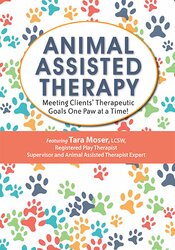

Have you ever considered practising Animal Assisted Play Therapy® (AAPT), but are unsure if it’s the right fit for your practice? Maybe you are interested, but you’re intimidated and don’t know where to start. Or, you already bring your animal to work, but are not confident in your ability to implement appropriate AAPT interventions. If you answered yes, this Animal Assisted Play Therapy® (AAPT) program is for you!
While integrating animals into therapy provides significant value to the therapeutic process – from beneficial hormonal release in both the client and the animal, to building trust, emotional regulation, and positive attachment with our clients – it is unwise and potentially hazardous without proper training. AAPT requires a complex set of skills, such as knowing how to:
Watch Tara Moser, LCSW, Registered Play Therapist Supervisor and Certified Animal Assisted Play Therapist Supervisor, in this recording and learn to successfully integrate animal-assisted therapy with play therapy. Under Tara’s expert guidance we will focus on the therapist-animal-client relationship, use of humour and play to enhance therapy, and well-being of your client and animal. We will discuss how AAPT is grounded in well-established theories and practices in terms of child development, clinical intervention, play therapy, family therapy, and humane animal treatment.
Tara will help you take your practice to the next level as she teaches you how to align client’s therapy goals to the appropriate AAPT interventions for improved outcomes with:
Through case studies, video demonstration and dynamic discussion you will end this recording with the skills and confidence to integrate dogs, cats and various other animals into your practice.
This online program is worth 6.25 hours CPD.
| File type | File name | Number of pages | |
|---|---|---|---|
| Manual - Animal-Assisted Play Therapy (4.14 MB) | 43 Pages | Available after Purchase |

Tara Moser, LCSW, RPT-S, C-AAIS, is a Licensed Clinical Social Worker in Florida and Registered Play Therapist Supervisor. She owns a private practice that specializes in play therapy. Tara is the founder of Pawsitive Kids Camp, a non-profit that integrates play therapy and Animal Assisted Play Therapy® with rescue dogs and children. She has served in a variety of therapeutic capacities, including non-profit individual and family counseling, foster care, elementary school-based counseling programs, behavioral therapy for autism, drug intervention and prevention, supervised visitation, and domestic violence counseling.
Tara has created play therapy courses for local universities and taught as an adjunct professor. She travels the country training on play therapy and Animal Assisted Play Therapy® to mental health, rehab and medical professionals, educators and parents. Tara is a graduate and past chair of APT’s Leadership Academy and has served on numerous APT committees, including ethics and practice, nominations board, conference program, leadership program, and key awards. She is the president for the Florida Association for Play Therapy. She has served locally and most recently as vice president for NASW Florida, in which retaining members was a goal. Tara’s professional excellence has been recognized by the SW Florida Unit of NASW as 2009 Social Worker of the Year and 2017 Field Educator of the Year. She was also awarded the 2009 Viola Brody Award by FAPT. Tara and her team of therapists are often called for debriefing on Animal Assisted Play Therapy® across the state. She is the co-author of an award-winning children’s book, Bode the Beach Dog: Life is RUFF!, a book to help children overcome fear.
Speaker Disclosures:
Animal-Assisted Play Therapy® (AAPT): A Relationship-Based Approach
Preparing Animal for Therapy Work
Align Client’s Therapeutic Goals to Appropriate AAPT Intervention
Apply AAPT to Treatment Goals for Clients with:
AAPT in Clinical Work … From Start to Finish
Give Your Animal a Voice in Therapy
Other Clinical Considerations
Satisfaction Guarantee
Your satisfaction is our goal and our guarantee. Concerns should be addressed to info@pesi.co.uk or call 01235847393.
Please wait ...